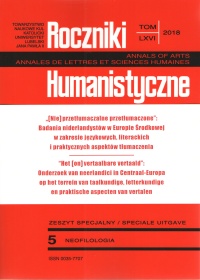How to translate the term: Translation options outside the framework of the term record
Abstract
Translators of specialised texts often consult multilingual terminology databases to find suitable equivalents for terms that they need to translate. Such databases are comprised of concept-oriented terminological records. Each terminological record consists of terms (in several languages) that refer to the same concept. We will illustrate on the basis of examples taken from a comparative study of terms and their translations in European source and target texts and in the European terminology database ‘IATE’ that translators sometimes propose translations that do not appear on concept-oriented terminological records. Starting from this observation, we will reflect on how future terminology databases for translators could be structured and enriched with results from contrastive corpus-based research.
References
Ball, Sylvia. 2003. ‘Joined-up Terminology — the IATE System Enters Production.’ In Verslag van het ASLIB congres, Londen. Toegankelijk op http://www.mt-archive.info/Aslib-2003-Ball.pdf [download 18 maart 2018]
Biel, Łucja. 2006. ‘Incongruity of Company Law Terms Categorization of Polish Business Entities and Their English Equivalents. Translation Journal 10 (4). Toegankelijk op http://www.accurapid.com/journal/38legal.htm [download 18 maart 2018]
Cabré, Maria Teresa, & Rosa Estopá. 2003. ‘On the Units of Specialised Meaning Used in Professional Communication.’ Journal of the International Institute for Terminology Research 14: 15–27.
Directorate-General for Translation. 2009. Programme for Quality Management in Translation: 22 Quality Actions. Toegankelijk op http://ec.europa.eu/dgs/translation/publications/studies/quality_management_translation_en.pdf [18 maart 2018].
Durán Muñoz, Isabel. 2012. ‘Meeting Translators’ Needs: Translation-Oriented Terminological Management and Applications.’ JoSTrans (18): 77–92.
Europese Unie. 2015. Gemeenschappelijke Praktische Handleiding van Het Europees Parlement, de Raad En de Commissie Ten Behoeve van Eenieder Die Bij de Opstelling van Wetgevingsteksten van de Europese Unie Is Betrokken. Luxemburg: Bureau voor publicaties van de Europese Unie.
Faber, Pamela (ed.). 2012. A Cognitive Linguistics View of Terminology and Specialized Language. Berlin & Boston: Walter de Gruyter.
Kerremans, Koen. 2014. Terminological Variation in Multilingual Europe. The Case of English Environmental Terminology Translated into Dutch and French. Brussel: Vrije Universiteit Brussel.
León Araúz, Pilar, Arianne Reimerink & Pamela Faber. 2011. ‘Environmental Knowledge in EcoLexicon.’ Proceedings of the Computational Linguistics-Applications Conference. 9–16. Toegankelijk op http://lexicon.ugr.es/pdf/leonetal2011b.pdf [download 18 maart 2018]
Peruzzo, Katia. 2013. Terminological Equivalence and Variation in the EU Multi-Level Jurisdiction: A Case Study on Victims of Crime. Trieste: University of Trieste.
Sager, Juan C. 1998. ‘In Search of a Foundation: Towards a Theory of the Term.’ Terminology 5 (1): 41–57.
Temmerman, Rita. 2000. Towards New Ways of Terminology Description: The Sociocognitive-Approach. Amsterdam & Philadelphia: John Benjamins Publishing Company.
Temmerman, Rita, & Marc Van Campenhoudt (ed.). 2011. The Dynamics of Terms in Specialized Communication: An Interdisciplinary Perspective. Amsterdam & Philadelphia: John Benjamins Publishing Company.
Translation Section of the ICTI. 2008. Best Practice for Terminologists. Intern document.
Williamson, D.F., & J.L. Dewost. 1997. Legislative Drafting — A Commission Manual. Toegankelijk op http://ec.europa.eu/governance/better_regulation/documents/legis_draft_comm_en.pdf [download 18 maart 2018].
Wright, Sue Ellen. 1995. Standardizing and Harmonizing Terminology: Theory and Practice. ASTM International.
Copyright (c) 2018 Roczniki Humanistyczne

This work is licensed under a Creative Commons Attribution-NonCommercial-NoDerivatives 4.0 International License.





